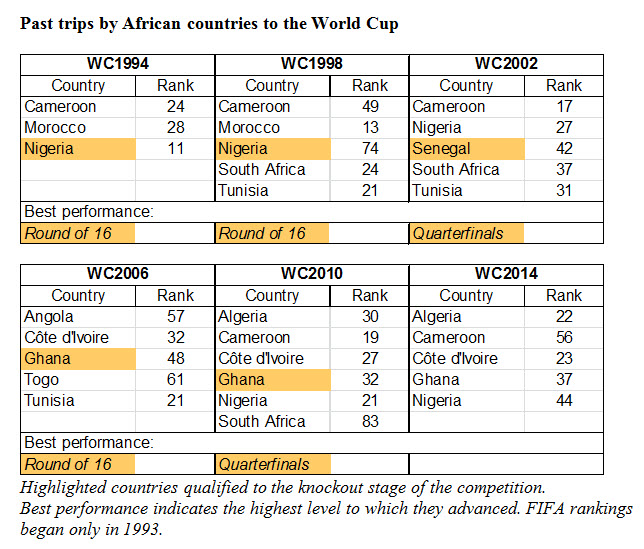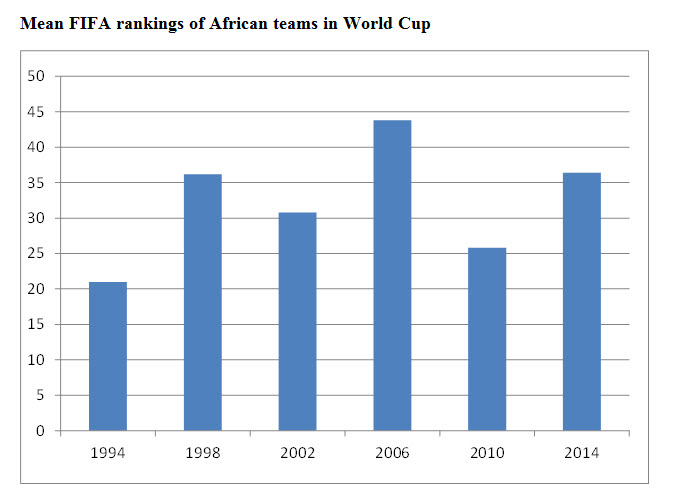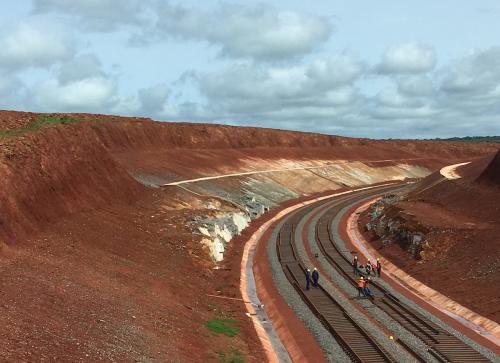Five teams carry the hopes of the African continent into World Cup 2014: Algeria, Cameroon, Côte d’Ivoire, Ghana and Nigeria. According to the pundits, those hopes will not be enough to get any of them into the knockout phase, but those pundits could well be wrong.
Predicting the World Cup is big business. Everyone from consulting giants to media conglomerates has a view, backed up by fairly sophisticated models and involving experts with reputable footballing wisdom.[1] Their prevailing view: African teams should not be preparing for an extended stay in Brazil.
The Bad News for Africa
Almost all models and punditry prognoses we have seen predict that all five will fail to make it past the group phase. The most optimistic forecasts are for Algeria and Côte d’Ivoire to come third in their group, still falling short of the knockout phase. Why are these predictions so dismal?
- The PwC World Cup Index lists five key determining factors for World Cup success: form, home advantage, quality of players, “footballing” interest and tradition. All five African teams score poorly in all of these parameters, whereas the traditional powerhouses from Europe and South America predictably dominate them.
- So far, the best any African team has managed in the World Cup is a trip to the quarterfinals (Cameroon in 1990, Senegal in 2002 and Ghana in 2010). In each World Cup since 1994, only one African team has made it to the second stage of the tournament.

- FIFA rankings reflect these handicaps. Algeria, at 22, is the highest-ranked African country in this World Cup. The average rank of the five countries is 36.4 (lower numbers denote higher rank). The average relative quality of the five African teams has worsened over the last four years (we exclude host South Africa whose automatic participation and low ranking distorted the numbers for 2010).

- The draw of the groups, as a result of the rankings, has not been kind to the continent. Ghana, a proud quarterfinalist in 2010, has to get past Germany, the United States and Portugal in one “group of death,” and Cameroon has to get past heavyweights Brazil, Mexico and Croatia in another such group—just to advance to the next stage.
- And finally, superstars Samuel Eto’o (Cameroon), Didier Drogba (Côte d’Ivoire) and Michael Essien (Ghana) are in the twilight years of their illustrious careers. It remains to be seen if they have the energy left to carry the hopes of the teams.
Five Reasons Why African Nations Might Defy the Odds
This is depressing stuff, but it is too early to despair. Pelé described football as the beautiful game (jogo bonito) and part of the beauty is in the unexpected. Here are the upbeat counterpoints:
- World Cup history is littered with moments of sheer genius and utter stupidity, of good and bad luck, close margins and magic (Maradona’s “Hand of God” followed two minutes later by the “Goal of the Century” in Mexico, 1986). Since soccer is a low-scoring sport, these moments can turn a game completely in a blink of an eye. Just one such moment and a team predicted to finish third in a group can leapfrog into second—and qualify for the next round.
- Statistically estimated probabilities are only as good as the data on which they are based. Historical results of past World Cups suffer from a sampling bias: There just weren’t enough African teams in past World Cups. FIFA quotas limited the Confederation of African Football (CAF) to three teams in WC1994 and WC1990 had just two! In addition, African teams have played much fewer games against teams from Europe or South America, hurting their chances to improve their rankings.
[2] - History cuts both ways. European teams have struggled in conditions outside their continent. The only exception was Spain winning WC2010 in South Africa, where winter in June suited the European teams. Brazil in sultry summer, with its tropical heat and humidity, is an entirely different playing field. In fact, climate has been the biggest worry for most European teams. The pace of games in Latin America will be understandably slower than in Europe. We should see less of the high-energy, high-pressure, tiki-taka style of play and more patient build up and sporadic fast counter-attacking tactics. And that favors the African teams more than their rankings suggest.
- One African team has always progressed to the knock out stage since WC1990, against the odds. So why should this year be any different? The five African countries this year are the same that played in South Africa, and so you have players with that vital recent World Cup experience that rival the traditionally stronger teams. And these teams appear to have overcome poor governance that hurt their performance in the past (Cameroon resolved its players’ dues earlier this week).
[3] - This may just be the time and stage for new African stars to emerge, and for the world to truly recognize that Yaya Touré, Wilfried Bony (both of Côte d’Ivoire) and Kevin-Prince Boateng (Ghana) have been underrated superstars. There is no longer any dearth of experience or tactical nous among the African players either. An overwhelming majority—103 of these 115 African players—play in elite European leagues, rubbing shoulders with the likes of Messi and Ronaldo on a daily basis. In addition, four of the coaches have built their experience in the cauldron of elite European soccer. Even otherwise, lack of established superstars may help coaches better manage their teams as they read from the same playbook: “the whole being greater than the sum of its constituent parts.”
The picture doesn’t look quite so bleak for African teams now, does it? While the pundits have wisdom in their predictions, Roger Milla (aged 38 at the time) and his pride of “Indomitable Lions” of Cameroon paid scant respect to their rankings when they defeated defending champions Argentina in the opening game of WC1990. Similarly, Senegal (ranked 42) defeated defending champions France in 2002.
With that unmistakable African spirit, it would not surprise us to see one or more of these five teams prove the predictors wrong and consolidate their past successes. In the end, World Cups are won or lost not in spreadsheets and regressions, but on the pitch. So, as the world turns its gaze towards Brazil, keep at least half an eye on the African upstarts. They might surprise us yet.
[1] PriceWaterhouseCoopers: www.pwc.com/en_GX/gx/issues/economy/global-economy-watch/assets/pdfs/global-economy-watch-june-2014-how-to-win-the-world-cup.pdf , Bloomberg: http://www.bloomberg.com/visual-data/world-cup/, Forbes: http://www.forbes.com/sites/prishe/2014/06/05/2014-fifa-world-cup-how-connected-is-a-countrys-soccer-and-economic-prominence/, ESPN: http://fivethirtyeight.com/interactives/world-cup/, and The Economist: http://www.economist.com/blogs/graphicdetail/2014/06/daily-chart, to name a few.
[2] Unlike the Olympics, World Cup outcomes are not correlated with economic conditions such as GDP per capita and income distribution. That then is an additional “relative” advantage for Africa.
[3] Player revolts are not endemic to Africa. They have plagued even teams like France (2010) and Republic of Ireland (2002).



Commentary
Five Reasons Not to Write Off Africa in World Cup 2014
June 11, 2014